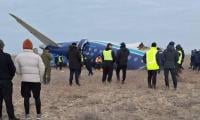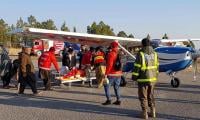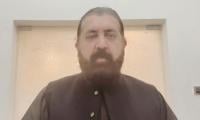VYAZMA, Russia: The remains of French and Russian soldiers who died during Napoleon’s catastrophic retreat from Moscow in 1812 were laid to rest on Saturday in a rare moment of unity between the two countries.
Officials and descendants of 19th-century Russian and French military leaders gathered for a windswept ceremony in the western town of Vyazma to re-bury the remains of 126 people killed in one of the bloodiest battles of Napoleon’s Russian campaign.
The snow fell and a military band played in temperatures of minus 15 degrees Celsius (5 degrees Fahrenheit) as uniformed pall-bearers carried eight flag-draped caskets at a cemetery in Vyazma, a town more than 200 kilometres (120 miles) west of Moscow.
The caskets containing the remains of 120 soldiers, three women and three teenagers were later put into the snow-covered ground to the sounds of a gun salute.
The earth had frozen, and the coffins were left in the ground covered by a white canvas.
"As generations pass, death and time reconcile everyone," Yulia Khitrovo, a descendant of Russian field marshal Mikhail Kutuzov considered a national hero for repelling Napoleon, said at the ceremony.
Prince Joachim Murat, a descendant of one of Napoleon’s most celebrated marshals, was also in attendance along with dozens of re-enactors in period uniforms.
The interment took place as France marks the bicentenary of the military leader’s death this year.
The remains were discovered in a mass grave by French and Russian archaeologists in 2019.
The dig was led by Pierre Malinowski, the Kremlin-connected head of the Foundation for the Development of Russian-French Historic Initiatives.
The three women are believed to be so-called "vivandieres", who provided first aid and kept canteens in the French army, while the three adolescents are believed to have been drummers.
All are thought to have fallen during the Battle of Vyazma on November 3, 1812 at the beginning of the French army’s retreat from Moscow and before the horrific crossing of the Berezina River.
The ceremony marked a rare moment of unity between Russia and Europe at a time of heightened tensions over a litany of issues including the Kremlin’s increasingly harsh crackdown on the opposition.
"Direct descendants of the main players in the conflict are meeting here together in a sign of reconciliation to commemorate the Russian and French soldiers that their ancestors commanded more than 200 years ago," Malinowski told AFP ahead of the re-burial.
The site was first discovered during construction work and was initially believed to be one of the many World War II mass graves that dot western Russia.
But research by the Russian Academy of Sciences later showed that the remains were of victims of Napoleon’s campaign, most of them in their 30s at the time of their death, said anthropologist Tatyana Shvedchikova.
Alexander Khokhlov, head of the archaeological expedition, said that the discovery of metal uniform buttons helped establish that some of the victims served in the French army’s 30th and 55th line infantry regiments and 24th light infantry regiment.
A 2018 artist’s concept shows the Parker Solar Probe spacecraft flying into the Sun’s outer atmosphere, called the...
Whatsapp logo is seen in this illustration taken, August 22, 2022. — ReutersTEHRAN: Iran´s top council responsible...
People attend a protest against government policies in Belgrade on December 22, 2024. —ReutersBELGRADE: Several...
Moldovan President Maia Sandu attends a meeting between leaders of EU countries and the governments of the "Eastern...
People walk in Jemaa el-Fnaa square, in Marrakesh, Morocco, October 22, 2024. — ReutersRABAT: Morocco proposed on...
Rescuers work at Okhmatdyt children's hospital in Kyiv, which was heavily damaged during a missile attack....







